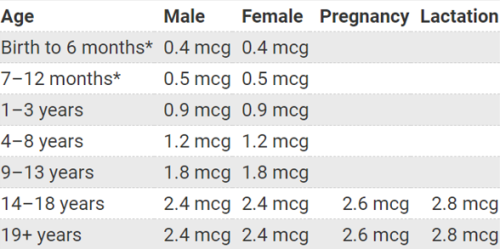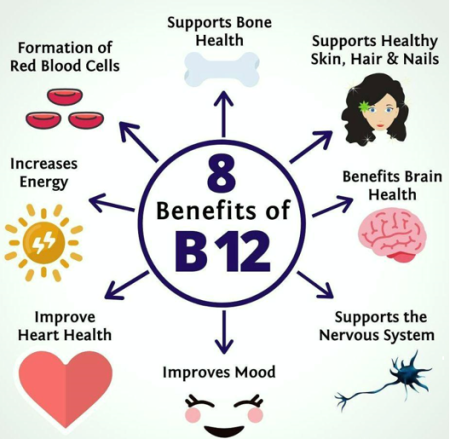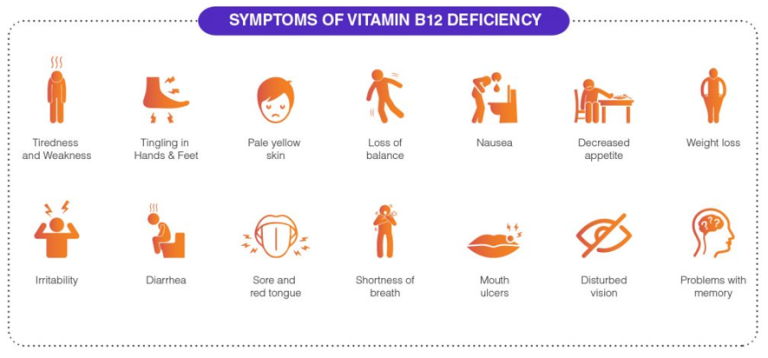
Overview
Vitamin B12 is a water-soluble vitamin that is naturally present in some foods, added to others, and available as a dietary supplement and a prescription medication. Because vitamin B12 contains the mineral cobalt, compounds with vitamin B12 activity are collectively called cobalamins. Vitamin B12 is required for the development, myelination, and function of the central nervous system; healthy red blood cell formation; and DNA synthesis.
Vitamin B12 status is typically assessed by measurements of serum or plasma vitamin B12 levels. The cut-off between normal vitamin B12 levels and deficiency varies by method and laboratory, but most laboratories define subnormal serum or plasma values as those lower than 200 or 250 pg/mL (148 or 185 pmol/L).
Vitamin B12 is present in foods of animal origin, including fish, meat, poultry, eggs, and dairy products.
Plant foods do not naturally contain vitamin B12. However, fortified breakfast cereals and fortified nutritional yeasts are readily available sources of vitamin B12 that have high bioavailability.
Recommended Intakes

Vitamin B12 is available in multivitamin/mineral supplements, in supplements containing other B-complex vitamins, and in supplements containing only vitamin B12. Multivitamin/mineral supplements typically contain vitamin B12 at doses ranging from 5 to 25 mcg. Vitamin B12 levels are higher, generally 50–500 mcg, in supplements containing vitamin B12 with other B-complex vitamins and even higher, typically 500–1,000 mcg, in supplements containing only vitamin B12.

Vitamin B12 Deficiency
Causes of vitamin B12 deficiency include difficulty absorbing vitamin B12 from food, lack of intrinsic factor (e.g., because of pernicious anemia), surgery in the gastrointestinal tract, prolonged use of certain medications (e.g., metformin or proton pump inhibitors), and dietary deficiency. Because people who have difficulty absorbing vitamin B12 from food absorb free vitamin B12 normally, their vitamin B12 deficiency tends to be less severe than that of individuals with pernicious anemia, who cannot absorb either food-bound or free vitamin B12. Certain congenital conditions, such as hereditary intrinsic factor defects and congenital vitamin B12 malabsorption (Imerslund-Gräsbeck disease), can also cause severe vitamin B12 deficiency.

The effects of vitamin B12 deficiency can include the hallmark megaloblastic anemia (characterized by large, abnormally nucleated red blood cells) as well as low counts of white and red blood cells, platelets, or a combination; glossitis of the tongue; fatigue; palpitations; pale skin; dementia; weight loss; and infertility. Neurological changes, such as numbness and tingling in the hands and feet, can also occur. These neurological symptoms can occur without anemia, so early diagnosis and intervention is important to avoid irreversible damage. In addition, some studies have found associations between vitamin B12 deficiency or low vitamin B12 intakes and depression. In pregnant and breastfeeding women, vitamin B12 deficiency might cause neural tube defects, developmental delays, failure to thrive, and anemia in offspring.
Treatment
Vitamin B12, in the forms of cyanocobalamin and hydroxycobalamin, can be administered parenterally as a prescription medication, usually by intramuscular injection. Parenteral administration is typically used to treat vitamin B12 deficiency caused by pernicious anemia as well as other conditions (e.g., tropical sprue, pancreatic insufficiency) that result in vitamin B12 malabsorption and severe vitamin B12 deficiency. Typically, vitamin B12 deficiency is treated with vitamin B12 injections because this method bypasses any barriers to absorption. However, high doses of oral vitamin B12 might also be effective.

Groups at Risk
– Older adults.
– Individuals with pernicious anemia.
– Individuals with gastrointestinal disorders.
– Individuals who have had gastrointestinal surgery.
– Infants of vegan mothers.
Medication Interactions
– Gastric Acid Inhibitors
Gastric acid inhibitors include proton pump inhibitors, such as omeprazole (Prilosec) and lansoprazole (Prevacid), and histamine 2-receptor
antagonists, such as cimetidine (Tagamet) and ranitidine (Zantac). These drugs are used to treat gastroesophageal reflux disease and peptic
ulcer disease. They can interfere with vitamin B12 absorption from food by slowing the release of gastric acid into the stomach and thereby
lead to vitamin B12 deficiency.
– Metformin
Metformin, an antihyperglycemic agent used as first-line treatment for prediabetes and diabetes, might reduce the absorption of vitamin
B12 and significantly reduce serum vitamin B12 concentrations.
Self Injection Instructions
The easiest site when self-administering an IM injection is the middle third of the vastus lateralis muscle of the thigh. Other options include the deltoid muscle of the upper arm and the dorsogluteal site on the bottom. This maybe useful if you have a carer or a family member willing to administer your injection. The angle of the needle with IM injections should be 90 degrees.
How to Give an Injection
1. Wash and dry hands to reduce the risk of infection.
2. Assemble the syringe and needle and withdraw the required amount of drug from the ampoule, with B12 this is normally all the drug in the
ampoule.
3. Disperse air bubbles from the syringe.
4. Change the needle. Doing so will ensure that the needle used for the injection is sharp, thereby reducing pain.
5. Insert the needle quickly into your preferred site and slowly and steadily inject the medicine. There is no need to pull back on the syringe to
check for blood.
6. Dispose of the used needle in a sharps container according to local policy.

